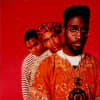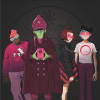 The track record for artist-specific rap documentaries is not stellar. Often they look cheap, are poorly shot and barely tell any kind of story. Actor and film director, Michael Rapaport, changed that with Beats, Rhymes and Life, his lovingly crafted new documentary about A Tribe Called Quest. Rapaport spoke about the tumultuous making of the movie, his admiration for the group, and how he’s dealing with Tribe’s very public frustration with the scenes of fighting and bickering that populate the second half of the film.
The track record for artist-specific rap documentaries is not stellar. Often they look cheap, are poorly shot and barely tell any kind of story. Actor and film director, Michael Rapaport, changed that with Beats, Rhymes and Life, his lovingly crafted new documentary about A Tribe Called Quest. Rapaport spoke about the tumultuous making of the movie, his admiration for the group, and how he’s dealing with Tribe’s very public frustration with the scenes of fighting and bickering that populate the second half of the film.
I first started talking about the idea of somebody making a documentary about A Tribe Called Quest at their last show in New York in 1998. You felt like something important was coming to an end. Years went by and it went away, then in 2006, I saw them perform at The Wiltern Theater in Los Angeles. They hadn’t performed together in a long time, and it was a great show. That night I said “Somebody’s gotta do a documentary about you guys,” and Chris Lighty, the manager of the group, was just playing around, like, “You should do it.” Then in 2008, they went back on tour for Rock the Bells. At the time, I was doing a very lucrative but unfulfilling acting job and I was so happy to invest my time and energy and also money into something I became obsessed about. It was a quick process.
I’d been shooting for about three weeks by the time we got to the end of the tour. At that point we started to hear them talk, “This is it. We’re never gonna do another show together.” My whole reason for doing the movie was: Will A Tribe Called Quest make more music? They were obviously having problems within the group. You could feel it. When that stuff started to reveal itself, I related to it on a human level. It became more interpersonal and I focused on that because I relate to fractured relationships. I know how hard they are to swallow. Seeing it within the group with guys that are my same age—we all come from New York, I felt like I knew them and they remind me of my friends.
There’s been this bullshit thrown around. I didn’t expect it to get this crazy and volatile. I have to take responsibility. I’ve acknowledged it privately to them, and I’m acknowledging it publicly to you. It’s been disappointing, it’s been frustrating, it’s been frightening. The thing that keeps me going is that the reaction from people who have seen the movie has been so positive. I’ve been making movies for 20 years, making a movie is a motherfucking hard thing to do. I knew this was going to be challenging, I just didn’t know exactly how the challenges were going to play themselves out.
Nothing will change my perception of A Tribe Called Quest’s music. I’m always gonna love the music. On a business level, I admit that I look at them differently. I don’t think I’m going to be in any rush to make A Tribe Called Quest Documentary Part Two any time soon. But, when all is said and done, I don’t have any real problems with them. They’re all good guys, they’re all nice guys. They’re sweet. I like spending time with them. For me, A Tribe Called Quest is like the Rolling Stones. I wanted to treat the documentary as if I were shooting the Rolling Stones in 1969 or 1971. If you grew up in hip-hop, they are the Rolling Stones.
— Michael Rapaport

If there’s one specific movement that pulled rap out of the world of eight-minute party singles and into the world of unified concept albums, it’s the Native Tongues. Loosely consisting of A Tribe Called Quest, De La Soul and the Jungle Brothers, the Native Tongues developed a new age take on Afrocentricity, taking inspiration (and samples) from their parents’ weirdest records and re-crafting them into a string of legendary albums. In addition to those classic releases, there were also some missteps. Ignored, underrated and sometimes unjustly cast aside upon their release, here are six records from the Native Tongues crew worth re-evaluating.
A Tribe Called Quest The Love Movement (Jive 1998)
Man, people hated this album! Up against previous Tribe classics like The Low End Theory and Midnight Marauders, it never had a chance. The trio was so at odds during the recording that Tribe effectively dissolved by the time it was actually released. In retrospect, though, it’s a beautifully restrained, hazy drug trip of a record that ended up being unjustly labeled as a snoozy departure from their earlier sound. It also paved the way for an entire new generation of rappers indebted to music produced for smoking weed in a beanbag chair next to a lava lamp. As appealing as that sounds on paper, no one ever approached Tribe’s initial take.
De La Soul Stakes is High (Tommy Boy 1996)
It’s not very much fun listening to pointlessly hateful rap, especially when the hate is directed at easy targets like materialism and R&B hooks. Not exactly groundbreaking things to hate on. But this was De La’s fourth album, and they’d apparently overloaded on disheartening music industry experiences. Looking for a restart, the group moved away from their collaboration with encyclopedic music genius Prince Paul, to craft their own beats. It’s a dark, often unjustly angry record, but it’s also a testament to their skill that it never gets frustrating or dull, due in no small part to Jay Dilla and the army of aggro horns he brings to his lone production contribution on the title track.
Jungle Brothers J Beez Wit The Remedy (Warner Bros. 1993)
Initially intended to be an album’s worth of free jazz weed raps, the Jungle Brothers ran into some label interference for making such an inaccessible album and were forced to mostly scrap their weird vision. This is the result of the compromise, and it is honestly still an exhausting listen. Regardless, it’s such a pure distillation of the vague idea of jazz rap that it’s worth paying extra attention to. The experimental parts—like the jittery “Blahbludify”—that did manage to sneak onto the final version are pretty formless, and even occasionally tedious, but today come off as occasionally worthwhile noise experiments, the first steps down a path the Jungle Brothers never tread.
Leaders of the New School T.I.M.E. (Elektra 1993)
Before he was a solo star, Busta Rhymes perfected his dungeon dragon snarl as a member of LONS, most famously on Tribe’s Native Tongues posse cut “Scenario.” Although unofficially a part of the movement, the title of their sophomore release was pure Native Tongues nag champa hippie philosophy—T.I.M.E. actually stands for The Inner Mind’s Eye. Expectations for LONS were high after their debut, A Future Without a Past, but on a critical level, the group failed to deliver. It’s like they got caught up in a whirlwind of overconfidence, never bothering to consider their own lyrics, instead obsessing over the sound of their own voices. Luckily, everyone has a strong style, from Busta’s growl to Charlie Brown’s booming Chuck D emulation. It almost doesn’t matter that it sounds like they forgot to write any lyrics down.
De La Soul Buhloone Mindstate (Tommy Boy 1993)
Buhloone Mindstate is so infamously underrated that it’s no longer actually underrated. After two hyper-conceptual, skit-filled albums, the trio’s swan song with Prince Paul was pretty focused. It’s also a great bridge into De La’s grimmer future, and, arguably, the record where the group finally perfected their voice as slightly sarcastic, but good-natured jokesters. Prince Paul’s anything-goes sampling was at its peak, even bringing in jazz veterans Maceo Parker, Pee Wee Ellis and Fred Wesley to fully connect the Native Tongues to the records they were inspired by. Stakes is High may have been the moment that De La got angry, but this album is when they finally planted their weirdo flag.
A Tribe Called Quest Beats Rhymes and Life (Jive 1996)
For this album, Tribe’s most all-over-the-place record, The group brought in Jay Dilla to help with production for the first time, as well as rapper Consequence, long before his Kanye affiliation. If anything, Beats, Rhymes and Life is proof of what happens when artists get so deep in the politics of the music industry that they forget making music is actually fun. If previous Tribe records celebrated music nerdery, this album was a mostly joyless move away from that, which is precisely what makes it fascinating. Everyone sounds wildly unhappy to be rapping, and the track list alone is a good window into the group’s grumpy vibe, beginning with “Phony Rappers,” hitting “The Pressure” toward the middle and then ending everything with “Stressed Out.”



